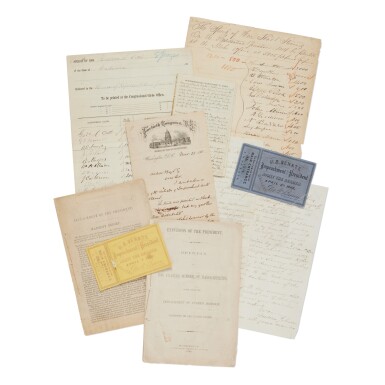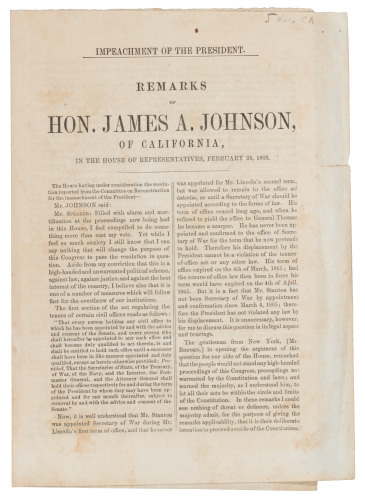Original engrossed copy of the first impeachment resolution vote of President Andrew Johnson in the House of Representatives, signed by all 57 "Yea" votes, 60 pp, 198 x 121 mm, with signature and embossed stamp of the Clerk of the House of Representatives, Edward McPherson, and assembled by Clerk of the House, Isaac Strohm, Washington, D.C., December 7, 1867, contemporary morocco, rebacked, with manuscript title on vellum inset to upper cover, repair to upper spine, vertical and horizontal band of minor stain to covers, housed in custom morocco box, folding cloth chemise. "Justice is the same in small things as in great." - George Boutwell, additional note at his entry. EXTREMELY RARE OFFICIAL ENGROSSED COPY OF THE FIRST IMPEACHMENT RESOLUTION VOTE IN THE HOUSE OF REPRESENTATIVE FOR ANDREW JOHNSON. First begun in January 1867, with Representative James Astley of Ohio introducing a resolution accusing him of corruption and authorizing the Judiciary Committee to open an inquiry. After the committee's report was submitted on November 25, 1867, on December 7th the House held the first full impeachment vote in American history, voting "yeas 57/ nays 108." The first successful impeachment in the House would wait until February 24th, 1868, following Johnson's second attempt to remove Edwin Stanton as Secretary of War, a blatant attack on the Senate's recently passed Tenure of Office Act. After Lincoln's assassination and the end of hostilities, Johnson was tasked with overseeing Reconstruction, including incorporating the rebels in the South back into the Union. Johnson's political fortunes had been based largely on his firm support of the Union—as the only Southern senator who did not resign his seat during secession. But his stance on Reconstruction, offering a quick restoration of seceded states, without offering much protection to former slaves, did not garner wide support, particularly with Northern Republicans. The country was split as never before, and Johnson found himself at odds with his own House and Senate. If Reconstruction provided the kindling for the country's first impeachment, then "it was the torch of Andrew Johnson's personal character that ignited the flame" (Benedict, p 3). In the words of historian Howard Beale, "He could bear insult personal danger, obloquy; but he could not yield his point." So when faced with a Senate that disagreed strongly with his plans, he utterly refused to be moved. Though Johnson's Reconstruction plan echoed Lincoln's, he was unable to communicate and negotiate with the legislative branch (as Lincoln might have) in order to reconcile the two views, leading inexorably to the impeachment showdown beginning in 1867. This extraordinary document was compiled by the engrossing clerk Isaac Strohm, with the certified copy of the extracts from the House resolution for impeachment, signed and stamped by House clerk Edward McPherson. Following are 57 autographed leaves of the "Yea" votes for the December 1867 impeachment, including Benjamin Butler, who would serve as an impeachment manager, as well as a slip signed by President Pro Tempore of the Senate Benjamin F. Wade, who would have succeeded Johnson as President had the Senate trial resulted in removal. An extremely rare reminder of an important first in American history.
Original engrossed copy of the first impeachment resolution vote of President Andrew Johnson in the House of Representatives, signed by all 57 "Yea" votes, 60 pp, 198 x 121 mm, with signature and embossed stamp of the Clerk of the House of Representatives, Edward McPherson, and assembled by Clerk of the House, Isaac Strohm, Washington, D.C., December 7, 1867, contemporary morocco, rebacked, with manuscript title on vellum inset to upper cover, repair to upper spine, vertical and horizontal band of minor stain to covers, housed in custom morocco box, folding cloth chemise. "Justice is the same in small things as in great." - George Boutwell, additional note at his entry. EXTREMELY RARE OFFICIAL ENGROSSED COPY OF THE FIRST IMPEACHMENT RESOLUTION VOTE IN THE HOUSE OF REPRESENTATIVE FOR ANDREW JOHNSON. First begun in January 1867, with Representative James Astley of Ohio introducing a resolution accusing him of corruption and authorizing the Judiciary Committee to open an inquiry. After the committee's report was submitted on November 25, 1867, on December 7th the House held the first full impeachment vote in American history, voting "yeas 57/ nays 108." The first successful impeachment in the House would wait until February 24th, 1868, following Johnson's second attempt to remove Edwin Stanton as Secretary of War, a blatant attack on the Senate's recently passed Tenure of Office Act. After Lincoln's assassination and the end of hostilities, Johnson was tasked with overseeing Reconstruction, including incorporating the rebels in the South back into the Union. Johnson's political fortunes had been based largely on his firm support of the Union—as the only Southern senator who did not resign his seat during secession. But his stance on Reconstruction, offering a quick restoration of seceded states, without offering much protection to former slaves, did not garner wide support, particularly with Northern Republicans. The country was split as never before, and Johnson found himself at odds with his own House and Senate. If Reconstruction provided the kindling for the country's first impeachment, then "it was the torch of Andrew Johnson's personal character that ignited the flame" (Benedict, p 3). In the words of historian Howard Beale, "He could bear insult personal danger, obloquy; but he could not yield his point." So when faced with a Senate that disagreed strongly with his plans, he utterly refused to be moved. Though Johnson's Reconstruction plan echoed Lincoln's, he was unable to communicate and negotiate with the legislative branch (as Lincoln might have) in order to reconcile the two views, leading inexorably to the impeachment showdown beginning in 1867. This extraordinary document was compiled by the engrossing clerk Isaac Strohm, with the certified copy of the extracts from the House resolution for impeachment, signed and stamped by House clerk Edward McPherson. Following are 57 autographed leaves of the "Yea" votes for the December 1867 impeachment, including Benjamin Butler, who would serve as an impeachment manager, as well as a slip signed by President Pro Tempore of the Senate Benjamin F. Wade, who would have succeeded Johnson as President had the Senate trial resulted in removal. An extremely rare reminder of an important first in American history.















Try LotSearch and its premium features for 7 days - without any costs!
Be notified automatically about new items in upcoming auctions.
Create an alert